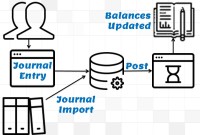- Home
- Business Processes
- Industry Knowledge
- Aerospace Industry
- Automotive Industry
- Banking Domain
- BFSI Industry
- Consumer/ FMCG Industry
- Chemicals Industry
- Engineering & Construction
- Energy Industry
- Education Domain
- Finance Domain
- Hospitality Domain
- Healthcare Industry
- Insurance Domain
- Retail Industry
- Travel and Tourism Domain
- Telecom Industry
- Leadership Skills
- eLearning
- Home
- Business Processes
- General Ledger (Record to Report)
- GL - Unearned / Deferred Revenue
GL - Unearned / Deferred Revenue
Unearned revenue is a liability to the entity until the revenue is earned. Learn the concept of unearned revenue, also known as deferred revenue. Gain an understanding of business scenarios in which organizations need to park their receipts as unearned. Look at some real-life examples and understand the accounting treatment for unearned revenue. Finally, look at how the concept is treated in the ERPs or automated systems.
What is unearned revenue?
Unearned revenues sometimes referred to as deferred revenues, are items that have been initially recorded as liabilities but are expected to become revenues over time or through the normal operations of the business. Unearned revenues (or deferred revenues) are revenues received in cash and recorded as liabilities prior to being earned. Unearned revenue is a liability to the entity until the revenue is earned.
Prepaid expenses and unearned revenues are created from transactions that involve the receipt or payment of cash. In both cases, the recording of the related expense or revenue is delayed until the end of the period or to a future accounting period as per accounting prudence and matching and accrual principles. It results from the company's receiving payments in advance for services or products that have not yet been provided. The company now ''owes'' that amount of services or products to its customer. This '' debt'' will be satisfied when those services or products are provided.
Examples of Unearned Revenue:
Some examples of unearned revenue are unearned rent, tuition received in advance by a school, an annual retainer fee received by an attorney, premiums received in advance by an insurance company, and magazine subscriptions received in advance by a publisher. Another example of unearned revenue would be if the customer paid a deposit for a custom ordered machine that has not been delivered, the deposit would be recorded as unearned revenue. A magazine subscription results in deferred revenue for the publisher because the payment is received in advance; it will be converted into actual revenue as issues of the magazine are delivered.
An airline that receives advance payment for tickets should also record the transactions as unearned revenue. Similarly, professional service providers such as accounting, legal, and contracting firms that accept deposits should record them as unearned revenue. Companies that provide warranties to their customers for an extended time period and charge for these warranties also deal with unearned incomes.
Accounting Treatment of Deferred Revenue:
Companies using the accrual accounting method should adhere to the revenue recognition principles and matching principles. Companies should recognize revenue only in the same accounting period in which it is earned. Consequently, when companies accept deposits or advance payments, they should record them as unearned revenues at the time of the receipt. Then, in the future when the goods or services are provided to the customers, they should adjust the entries as earned income.
Unearned revenue is treated as a short- or long-term (or both) liability on a company's balance sheet, based on the nature of the entry and underlying business contract. This type of adjusting entry will be adjusted by another entry as and when the revenue will be earned to recognize revenue and offset the deferred revenue.
Examples of industries having unearned revenue:
Unearned revenue can be applied in almost all industries however it becomes very important in the case of some industries where advance payments are the norm like subscriptions for magazines. Companies providing extended warranties need to treat their sales as unearned revenues at the time of sale.
Industries dealing in products that require installation services are accounted for as multiple-element arrangements, where the fair value of the installation service is deferred when the product is delivered and recognized when the installation is complete. For installations with customer acceptance provisions, all revenue is generally deferred until customer acceptance.
Warranty billings are generally invoiced to the customer at the beginning of the contract term. Revenue from extended warranties is deferred and recognized ratably over the duration of the contract. When a dealer sells (sells being the keyword) a service contract not all of the revenue is recognized at the time of sale. Instead, it is recognized over the life of the contract and recorded as Deferred Service Contract Revenue in the liability section of the balance sheet. Each month and or year a portion of the deferred revenue is moved from liabilities to income. Unearned extended warranty revenue is reflected as unearned revenues in accrued liabilities in the balance sheets.
Revenue from separately priced, self-insured service contracts is deferred at the point of sale and generally recognized on a straight-line basis over the life of the contract for GAAP presentation.
Accounting Entries for Unearned Revenue:
In automated systems, you can define rules that can determine the event which triggers the revenue recognition. Till the time that recognition event is triggered, the amount remains parked in an unearned revenue account as a liability. If you enter an invoice with a Bill in Advance invoicing rule, Receivables creates the following journal entries.
In the first period of the rule:
Debit: Receivables
Credit: Unearned Revenue
In all periods of the rule for the portion that is recognized:
Debit: Unearned Revenue
Credit: Revenue
Related Links
You May Also Like
-
Multitude of these legal and operational structures clubbed with accounting and reporting needs give rise to many reporting dimensions at which the organization may want to track or report its operational metrics and financial results. This is where business dimensions play a vital role.
-
Learn the typical accounting cycle that takes place in an automated accounting system. We will understand the perquisites for commencing the accounting cycle and the series of steps required to record transactions and convert them into financial reports. This accounting cycle is the standard repetitive process that is undertaken to record and report accounting.
-
Introduction to Organizational Structures
Organizations are systems of some interacting components. Levitt (1965) sets out a basic framework for understanding organizations. This framework emphasizes four major internal components such as: task, people, technology, and structure. The task of the organization is its mission, purpose or goal for existence. The people are the human resources of the organization.
-
What is Accounting & Book Keeping
Accounting is a process designed to capture the economic impact of everyday transactions. Each day, many events and activities occur in an entity, these events and activities are in the normal course of business; however, each of these events may or may not have an economic impact. Events or activities that have an effect on the accounting equation are accounting events.
-
In this article we will discuss various types of "Management Entities". Various types of operational units, are created by management, to effectively run, manage and control their business. Different types of functional units, and divisional units, are widely used across industry.
-
In some of the ERP tools, there are more than 12 accounting periods in a financial year. This article discusses the concept of accounting calendar and accounting periods. Learn why different companies have different accounting periods. Understand some of the commonly used periods across different organizations and the definition & use of an adjustment period.
-
Global Business Services (GBS) Model
Global business services (GBS) is an integrated, scalable, and mature version of the shared services model. Global Business Services Model is a result of shared services maturing and evolving on a global scale. It is represented by the growth and maturity of the Shared services to better service the global corporations they support.
-
Internally, an organization can be structured in many different ways, depending on their objectives. The internal structure of an organization will determine the modes in which it operates and performs. Organizational structure allows the expressed allocation of responsibilities for different functions and processes to different entities such as the branch, department, workgroup and individual.
-
GL - Journal Posting and Balances
In this tutorial, we will explain what we mean by the posting process and what are the major differences between the posting process in the manual accounting system compared to the automated accounting systems and ERPs. This article also explains how posting also happens in subsidiary ledgers and subsequently that information is again posted to the general ledger.
-
As the business grows, the company may want to transition to a branch structure as branches are allowed to conduct a much broader range of activity than representative offices. Branches can buy and sell goods, sign contracts, build things, render services, and generally everything that a regular business can do. A company expands its business by opening up its branch offices in various parts of the country as well as in other countries.
Explore Our Free Training Articles or
Sign Up to Start With Our eLearning Courses

About Us
Learning
© 2023 TechnoFunc, All Rights Reserved









